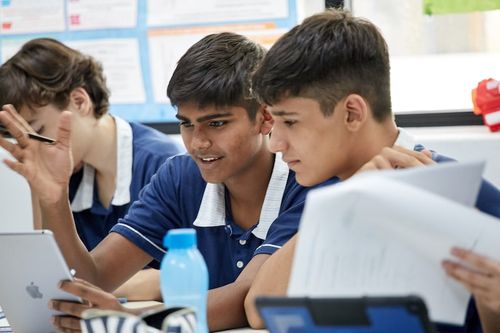As you are searching for a pre-university programme for your child, it’s likely you are finding a lot of information about the IB Diploma Programme (IB DP), the A-levels and the American Advanced Placement courses. While these educational programmes are similar in the sense that they strive to prepare secondary students for their university studies and careers, there are also distinct differences that you should be aware of.
IB DP vs A-levels and the Advanced Placement courses
By taking the time to understand the differences between these three different options, you will begin to have a better idea of which type of pre-university programme would be best for your child.
What is the IB Diploma?
What are the A-levels?
or the GCE A-levels, is the educational qualification that is offered in the United Kingdom and a number of other countries to students completing their secondary education. A number of countries, including Singapore, Uganda, Kenya, Mauritius and Zimbabwe have developed qualifications with the same name as and a similar format to the British A Levels. The A-levels are generally worked towards over 2 years and widely regarded around the world as a premier option for secondary school students with universities granting offers based on A-level grades achieved.
What is the Advanced Placement?
The Advanced Placement Program is offered by the College Board (who also prepare the SAT) in high schools throughout the United States and Canada. It is not a stand-alone programme of study but is offered as individual courses (at Advanced Placement level) by high schools who often combine it with their own high school diploma. Each Advanced Placement (AP) course is designed to provide learners with collegiate-level coursework. Students who pass the AP exam for an AP course are well-prepared for further study in that area and are eligible for credit in American universities.
A Comparison of IB DP, A-levels and Advanced Placement courses
There are several significant differences that you will want to compare when deciding between the IB DP, A-levels and the AP. Here are a few to keep in mind:
The Curriculum
There are distinct differences between the curricula offered by the IB Diploma, A-levels and the Advanced Placement courses. Here is what you need to know:
- The IB DP curriculum features a comprehensive set of courses, and many of the courses are interconnected to one another. There are six subject groups, including Studies in Language and Literature, Language Acquisition, Individuals and Societies, Sciences, Mathematics and the Arts. In addition to this, students who are enrolled in the IB DP also have to complete a Theory of Knowledge course, a Creativity, Activity and Service (CAS) component and an Extended Essay. This gives students a well-rounded education focusing on their social, emotional and academic development.
- The A-level curriculum is different in the sense that there are only 3 or 4 subject areas that students usually focus on. University offers are based on 3 A-level grades, therefore students tend to focus on 3 subjects in their second year. There are no specific subject requirements for the A-levels, so students can choose their preferred subject options. Usually students pick courses based on the degree they wish to pursue in university. They will study those courses in-depth and develop a significant exposure in those areas. This is ideal for students who know which type of career they want to pursue and where they want to focus their studies.
- Advanced Placement courses offer a consistent curriculum, regardless of which high school a student attends. The curriculum is created by the College Board and implemented by the individual school which offers the course. There are no minimum number of courses for students. All Advanced Placement courses are designed to be college-level courses that require higher-order thinking and excellent writing skills. The number of AP courses available and specific options at an individual high school will vary based on what that school is capable of offering its students.

The Course Structure
In addition to having distinct differences when it comes to the structure of the curriculum, there also are differences in the individual course structure. Here’s what you should know:
- IB DP courses will cover any topic in-depth, but also present information that will link it to the other courses within the curriculum. All IB courses are developed to fit the needs of the IB learner profile and encourage students to be thinkers, inquirers, risk-takers and communicators. In addition to providing students with valuable academic information, all courses are structured to encourage the development of core values, such as being empathetic, open to differing viewpoints and internationally-minded. The IB Diploma Programme was designed based on inquiry and it aims to provide students with both a local and global perspective on their learning.
- A-level courses are in-depth, structured courses that stick to the topic at hand. Many parents and students who opt for the A-level programme praise it for its ability to cover topics completely and accurately. After completing their A-levels, students have a certain level of expertise in the subjects they pursue due to the in-depth nature of the coursework. These types of courses are best for students who already know which type of career they would like to pursue in the future, as they will focus more intently on that subject.
- The Advanced Placement is known for its fast-paced curriculum, and high school students should expect to take on a lot of independent reading and writing in order to master the course. To make these courses similar to what students will experience at university, most Advanced Placement courses are lecture-based. Students will improve their note-taking skills, and learn how to pace themselves in order to meet all deadlines established in the course syllabus. The final exams are assessed more traditionally than the IB DP and rely heavily on factual recall. They also go in-depth into specific topics, hence students need to do a lot of independent study, memorisation and research to pass their AP exams.
The Emphasis on Skill Development
The IB Diploma is known for making skill development a top priority, with many of its courses offering opportunities for hands-on learning and skills-based instruction. A-levels, on the other hand, have a more academic focus.
Similar to the A-levels, Advanced Placement courses focus more heavily on academic skill development. Students will focus on paying attention during lectures, independent reading and in-depth research and writing.
Assessments and Exams
It is worth noting that the IB DP is governed by one consistent exam board, while there are various boards that evaluate the exams of A-levels. In addition, A-levels use the traditional letter grade system, while IB DP utilises a points-based system.
The Advanced Placement exams administered by the College Board are assessed on a scale of 1 through 5. Students who receive a 1 will not be recommended to receive college credit, while those who receive a 5 are considered extremely well qualified for college credit.
Why OWIS offers the IB DP
The IB DP, A-levels and Advanced Placement courses are considered premier pre-university educational programmes that are accepted by the top universities around the globe. At OWIS, we believe the International Baccalaureate Diploma Programme is the best choice for our secondary school students. It is a proven pre-university programme that is respected around the world, and its global focus complements the overall mission at OWIS.

We strongly believe that our students benefit from our multicultural student body and our international approach to education, and the IB DP allows us to reinforce our commitment to our mission. The International Baccalaureate Diploma Programme at OWIS will help your student become an internationally-focused learner who is uniquely prepared for a competitive global economy.
To get more information about the IB DP and how it could benefit your child, contact One World International School today and set up a school tour.
(This blog was originally written in collaboration with Ms Iris Tay, former Senior Coordinator – IB DP & ToK Teacher, OWIS Nanyang.)














